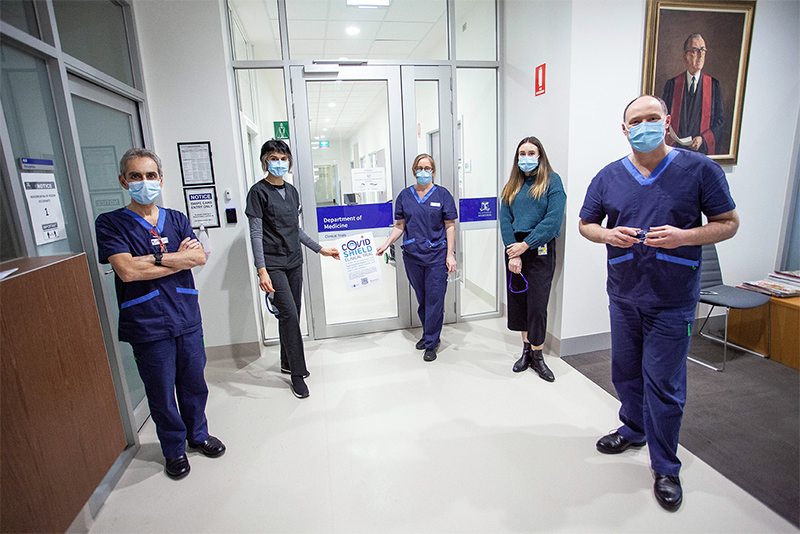Source: St Vincent’s Hospital Melbourne
Healthcare workers are part of the first line of defence in today’s fight against COVID-19. But as this global virus continues to spread, the demands on our medical sector are becoming greater, and riskier, than ever.
St Vincent’s Hospital Melbourne (SVHM) is playing a pivotal role in an Australian-led clinical trial to determine whether hydroxychloroquine can protect healthcare workers from contracting COVID-19 while caring for COVID-positive patients.
The COVID SHIELD Clinical Trial is a collaborative project led by the Walter and Eliza Hall Institute of Medical Research, in partnership with human data science company IQVIA and various healthcare providers across the country, including SVHM, which is a screening site for the trial and has been heavily involved in the design of the study.
Associate Professor Mandana Nikpour, one of COVID SHIELD’s lead principal researchers and a consultant rheumatologist at SVHM, says during the pandemic hundreds of thousands of healthcare workers have been infected worldwide, demonstrating the value, need and urgency of this clinical trial that focuses on prevention rather than cure.
When the trial started in June, more than 10 per cent of COVID-19 cases in Australia were linked to healthcare workers. In the second wave of infections in Victoria, more than 1000 healthcare workers have been infected.
“For every healthcare worker who is infected, quite a few then have to be tested, or go into self-isolation for two weeks. This has had an impact on the physical and mental health of healthcare workers, as well as an impact on the workforce we have available to undertake frontline duties,” A/Prof Nikpour says.
What we know so far
The randomised, gold-standard clinical trial will see half the participants given hydroxychloroquine tablets, while the other half will receive placebo tablets over the course of four months.
Hydroxychloroquine is commonly used in the treatment of lupus and rheumatoid arthritis. Having used the drug to successfully treat patients with both these conditions, A/Prof Nikpour says initial findings indicate hydroxychloroquine could potentially help us get on the front foot in the fight against COVID-19, where healthcare workers are concerned.
“In the test-tube, hydroxychloroquine reduces the replication of SARS Coronavirus 2, which is the COVID-19 virus, by about 90 percent,” she explains.
“When you are very sick or ventilated in hospital you have a lot of inflammatory molecules causing collateral damage to organs, and it is not possible at that point to intervene with a drug like hydroxychloroquine. However, hydroxychloroquine could potentially reduce the risk of COVID-19, if taken prior to exposure to the virus, that is, as ‘pre-exposure prophylaxis’ or ‘PrEP’.”
During the trial, participants will regularly report, via an electronic data-capture platform, any COVID-19 symptoms they may be experiencing and whether they have been tested for the virus or been diagnosed with it.
“They also get smartphone alerts daily to remind them to take their medication and monitor their progress, including any side effects. The eDiary also checks whether they have had contact with anyone who has tested COVID-positive,” A/Prof Nikpour says.
Teamwork triumph
A/Prof Nikpour says one of the big strengths of SVHM’s involvement is how the hospital’s Rheumatology and Intensive Care teams have pulled together to lead the site’s contribution to the project.
“I have been really touched and inspired by all the support we’ve had across the various units and the hospital, and the opportunity to work with the Intensive Care Unit research team has been incredible. I feel privileged to have the opportunity to collaborate with Professor John Santamaria, head of ICU, and his research team, especially given the pivotal role that our Intensive Care Unit is playing in the management of our sickest COVID-19 patients,” she says.
“Our work at the SVHM site really shows how healthcare workers are trying to find something that will help other healthcare workers.”
Forging a united front
With Victoria recording the highest number of cases across the country to date, A/Prof Nikpour says they will be looking to recruit about 650 participants locally, with almost 40 participants recruited from the SVHM campus to date, only three weeks into recruitment at this site. Many more are registering interest on the recruitment hub and will be enrolled in the coming weeks.
“So much of what is happening right now is out of our control, but this trial is making us feel empowered again. The people we are enrolling often tell us the trial is giving our healthcare workers some hope.”
Enrol now to be part of a COVID-19 prevention trial
If you are a health care worker and would like to discuss trial participation with a nurse or register your interest please visit the COVID Shield website.
Related:
COVID-19: Nigerian study finds Chloroquine, Hydroxychloroquine effective as Prophylaxis
India: HCQ beneficial as preventive drug: SMS doctors told ICMR
Twin Covid-19 patients in South Carolina: one received hydroxychloroquine, the other did not.
Hydroxychloroquine Is Widely Used Around the Globe
CCP leaders are secretly taking Hydroxychloroquine to prevent COVID-19
Brazil: Mayor used hydroxychloroquine and highlights 83.88% cured with covid kit
61 studies (37 peer reviewed) Early treatment studies are very positive – COVID deaths: 621, 206

